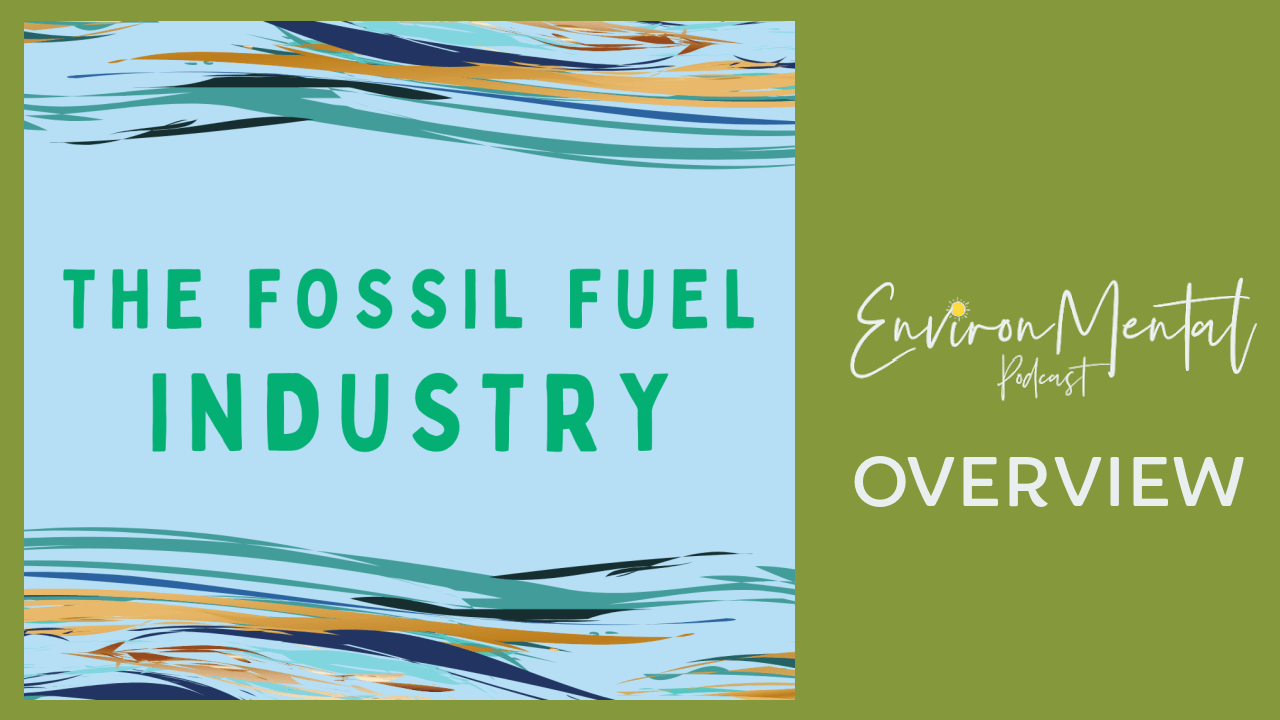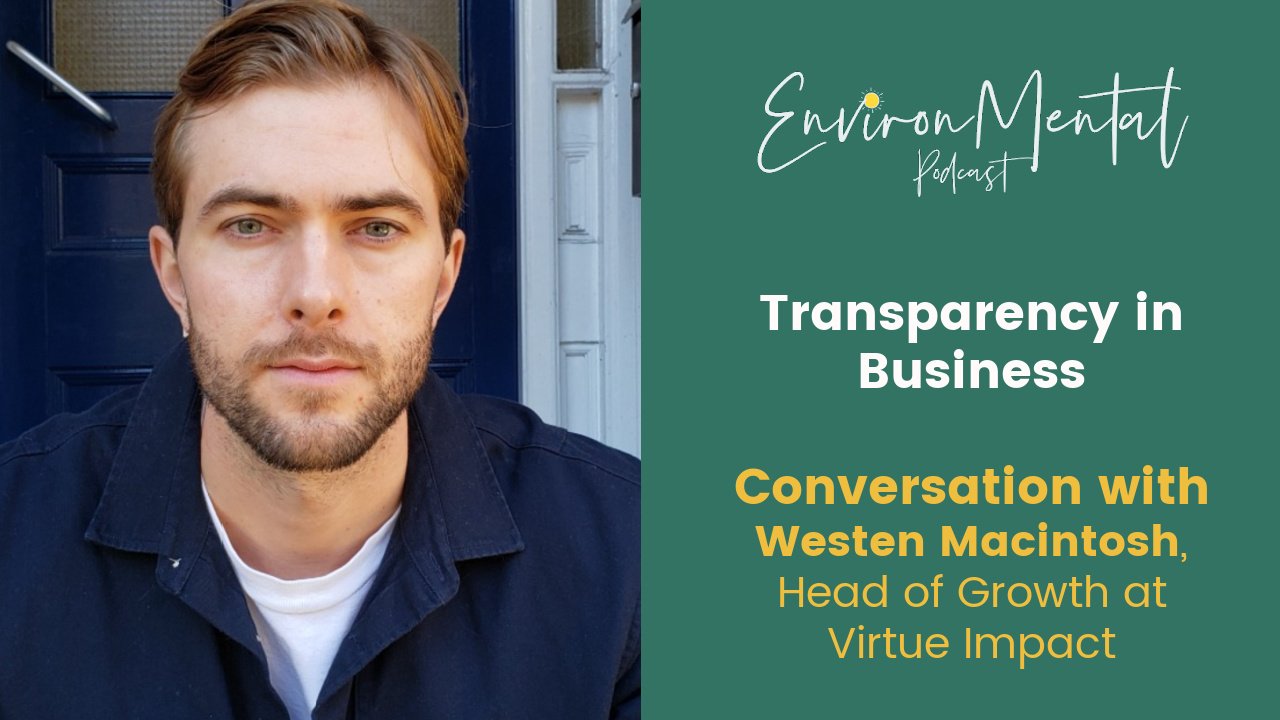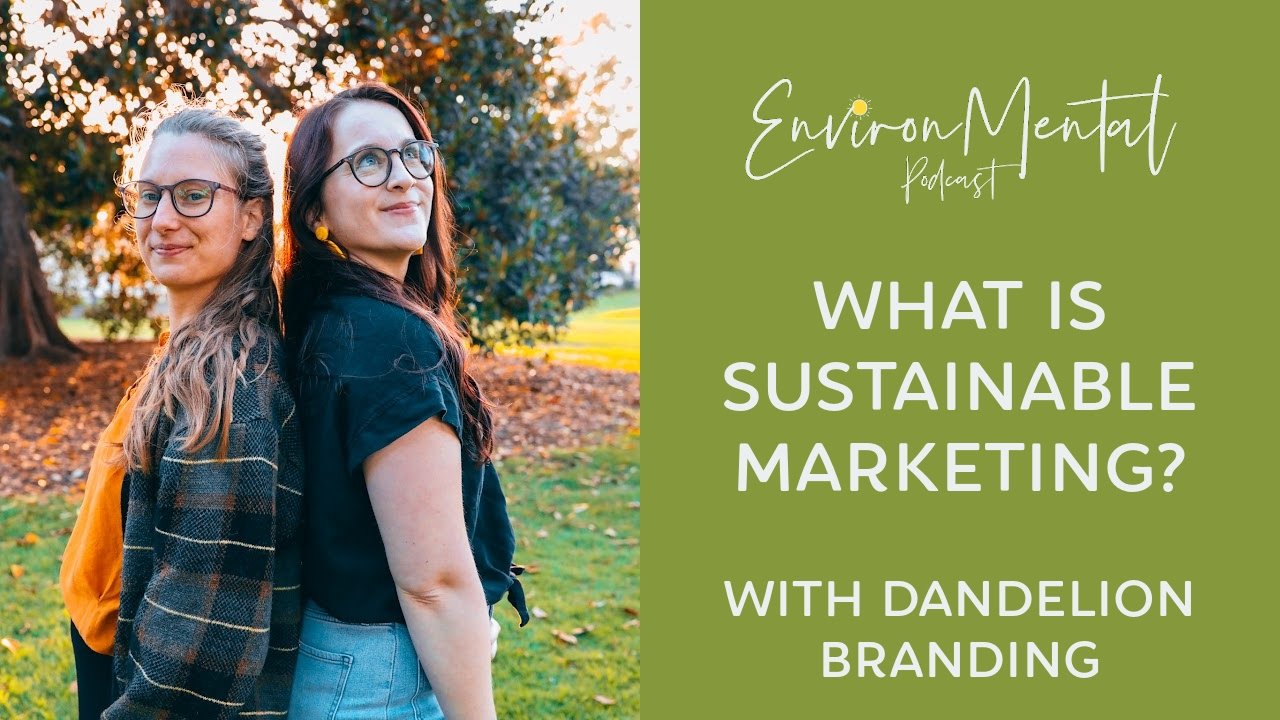Every month we investigate a different topic that weighs heavily on the sustainability industry. We identify our questions, try to understand the whole picture, and research independently throughout the month. We record our conversations about each step of the learning process on our weekly podcast – EnvironMental.
Our goal is to understand the global sustainability industry better. We want to see sustainability from all the angles so that we can offer real solutions to brands, individuals, and the industry as a whole.
You can find all of our EnvironMental conversations here.
This month we did a deep dive into the fossil fuel industry.
EnvironMental Podcasts April 2021: Fossil Fuels
We started out this month with hope. We had decided to spend two months talking about energy. And so, we set the intention to understand where we are in the energy transition and the truth behind the different stories we hear from the media.
It’s common knowledge that the fossil fuel industry is responsible for terrible, heinous acts against the environment and human rights alike. They regularly create sovereign agencies within countries that have corrupt or lazy governments, lax tax laws, and abundant natural resources. They use money to wield political power and exploit the people they take into their service.
And we asked – can we separate the energy from the industry?
Click Here to Watch the Fossil Fuels Intro Video
And then it turned out that we cannot separate the energy from the industry. We listened to the book, “The Moral Case for Fossil Fuels” by Alex Epstein. Hearing someone defend fossil fuels as having a causative relationship for every type of growth and human ingenuity while claiming “human benefit” as their standard of value felt dirty. This book felt like propaganda, it felt cultish and a defensive gross misrepresentation of the truth. It left us frustrated, with more questions than answers. We now have a healthy understanding of how the fossil fuel industry spins the story just enough to make the public doubt the science behind climate change and our addiction to energy.
Click Here to Watch the Book Discussion
In the third episode, we split up and dug independently into the issues to find the truth. Then came back together to share what we learned. Courtney looked into the injustices, and potential issues with mining for renewable energy and found that we might just be swapping one issue for another one. While aub followed the money, looked into how much fossil fuels we are using now, and how much we have left. What we came to is that in general, the relationship we, as a global society, have with the fossil fuel industry, is a toxic, abusive one that we are in the beginning stages of figuring out how to leave. And we don’t think the transition away will go down without a fight.
Click Here to Watch the Specific Research Episode
Along with sharing our sources below (there are a lot), two other podcasts stood out that are specifically directed towards uncovering information about the fossil fuels industry. These are the Crisis podcast from Vice media, and Drilled from Critical Frequency.
The Problems with Fossil Fuels
Actually the list of positives is shorter than the negatives. And that’s unfortunate because right now, we need fossil fuels for every aspect of our lives. That gives a lot of power and money to the industry. Power and money that fossil fuel companies, in large part, aren’t using for the good of our society.
While this is an article about fossil fuels as it relates to sustainability and the climate crisis, the other aspects of sustainability are in jeopardy here too. Since we learned that we can’t separate the energy from the industry early on in our investigative month, I’m going to include a very basic overview of issues here.
1 – Fossil fuels energy is running out
We’re going to start here with problems. Because the fact of it is, the planet cannot sustain our energy usage for another generation without change.
You’ll see a lot of people like Alex Epstein saying that with more tech we can get more fuel virtually forever. While that’s not false, it’s also not the whole picture. The deeper we go into our planet to get energy, the less viable it is. It needs more refinement and there is less of it as the end product. In reality, we have about 30-40 years left at our current rate of usage.
2 – The energy isn’t clean and it is contributing to climate change.
We tried to entertain the idea of man made, or fossil fuel climate change denial throughout this month, just to see if there was anything to it. There’s not.
The climate deniers run out of facts almost immediately when you start looking into any climate science. So then, you start to hear stuff like, “with more CO2 in the atmosphere, the plants are happier because that’s what they breathe, so we can grow more food.” That’s just bullshit. The food they’re talking about is a genetically modified version of the food you have today, which is not better for you. Don’t fall for it.
Regardless of what the propaganda says, fossil fuels are contributing to climate change. Whether that’s a good thing or a bad thing IS a personal opinion, sure. But it is absolutely leading to more difficult living conditions for many plant and animal species on the planet (which does include humans).
3 – Environmental disaster is the norm
Right on the heels of dirty energy and climate change is an even more local example. The mines, plants, refineries, and company outposts that fossil fuel companies create regularly cause local environmental disasters.
And we’re not just talking about oil spills from pipeline leaks and earthquakes from fracking (which is common). It’s even more insidious. Development in salt water can kill coastal freshwater marshes. Pumping water from rivers and replacing it with waste water can contaminate drinking water for towns. Refineries release toxic chemicals in overwhelming amounts leaving the air dangerous to breath and the water unsafe to drink.
Oil companies, owned and operated by citizens of industrial countries regularly contract in less developed countries so that they are less susceptible to environmental policy and law. This allows them to create sovereign entities, whole communities, within countries that threaten the ecosystem and the environment without penalty.
4 – Human rights violations are rampant
And workers within those sovereign entities are treated almost as poorly as the environment around them.
One of the things that was most painful to listen to this month was Epstein continually calling fossil fuels “cheap and reliable.” He kept saying that human benefit was his standard of value, and referred to slavery several times as a thing of the past.
This is absolutely appalling. It doesn’t take long to find examples of slavery, forced labor, unsafe working (and living) conditions, exploitation, or coverups of heinous acts (like murder and/or massacres) within the industry. And this isn’t “one bad seed” This dating all the way back to day one, with John D. Rockefeller and the Colorado coal mines (Ludlow Massacre).
One fantastic example is the Vice Podcast, The Crisis. Which is a closeup look of ONE fossil company, and how they treat their workers. That’s the standard that we have come to expect.
5 – In the pockets of politicians, police, and paramilitary
We also expect that whatever power the fossil fuel companies aren’t in control of, they will just pay off whomever is in power.
They buy off politicians including put a lot of funding towards United States police budgets (which are connected with politics) to hold the status quo. The industry doesn’t want policy change because it affects their bottom line. So they put (or pay) people in powerful roles to sow uncertainty across political lines.
The energy sector thrives off of global tension and instability. They have (and will continue to) spend billions of dollars on military and paramilitary activity around the world to ensure that tensions continue. War is money and power, and that’s what this industry thrives off of.
Because surely they have enough money for it.
6 – Fossil fuels subsidies are outrageous
And they have the money for this stuff because we absolutely do not pay the true cost of our energy. Globally, governments subsidize the activity of energy companies to the tune of a trillion USD per year.
Remember how they’re in the pockets of the law makers here, and they make money from instability in developing nations?
Yes, well, all part of a brilliant plan. Because fossil fuel companies also get grants and subsidies when they develop their businesses in nations that are less developed than the US and its European counterparts.
So they’re paid to develop in nations where they can fund military activity that causes instability that will keep the nations underdeveloped, where they use free (or severely underpaid) labor and cause unprecedented environmental upheaval – which furthers regional and cultural instability. (see where we’re going with this?)
And then they lie about it.
7 – Their propaganda is effective
In fact, fossil fuel companies lie about a lot of stuff. They treat it like it’s their right to do so because a citizen has a right to lie and court cases like Citizens United and the Hobby Lobby religious beliefs case give corporations very similar rights as citizens.
[Note that there are corporate rights cases that date back to the beginning of the US that set the precedents for this as well.]
These companies have shaped the way we interact with media since the early days of national newspapers. When Standard Oil was split into several companies to avoid monopoly lawsuits, they started hiring PR guys to help smooth tensions while they expanded without unionizing. That was more than 100 years ago (1911).
Long Term Media Manipulation
The fossil fuel companies knew in the 70s that oil and natural gas and coal were causing CO2 levels to increase, and they hired teams of the best scientists to study it. They treated the potential for climate change as a fact until 1989, when they realized that US policy changes like sanctions on CO2 emissions would disrupt their bottom line. They fired their scientists and started actively sowing the seeds of climate denial, specifically targeted at “older, less educated males from large households who are not active information seekers and not likely to be green consumers.”
The fossil fuel companies were also behind the idea that pollution, global warming, plastic usage, energy consumption (everything) was a consumer problem – not an industry problem. This allowed them to shirk the responsibility even further. It took our eyes off of the fossil fuel companies and laid the blame at our own feet – allowing them less time in the lime light for scrutiny.
Evil. Geniuses.
If you’re interested in learning more specifically about media, and the propaganda of the fossil fuel industry, check out the podcast Drilled by Critical Frequency. They do a GREAT job of walking you through exactly how we got to where we are today.
5 Ways Your Small Business Can Help Stop Damage from Fossil Fuels
Okay – so fossil fuels and the fossil fuel industry is problematic. What does this even have to do with your small business?
Everything.
1 – Demand more from your supplier
You and your small business are often the middleman between the industry and the consumer.
As much bullshit as the “consumer problem, not industry problem” propaganda is, as you grow a sustainable brand, your customers trust you. They look to you for answers, and they want you to give them clues about what to expect.
Remember that the fossil fuel industry is selling a product. They hide behind “the demand is there, we just supply” a lot – so remove the demand for fossil fuels.
And move the demand towards evermore transparency. Learn about how your factories are set up, and find ways to help them transition away from fossil fuels as a means to create your product.
Make it clear that you don’t stand for unethical treatment or people or the planet in any part of your supply chain and your suppliers will get wise or lose money. If we can do this in volume, we will put pressure on the fossil fuel industry.
2 – Change your energy supplier away from fossil fuels
If it’s possible, look into the companies that supply your energy. In most industrialized places, you can usually pay to switch your provider to a more renewable source now.
Again, this is divesting from fossil fuels on a personal level. If you can do it with your office building, within your household, your community, or in the creation/distribution of your products, you’re doing something.
3 – Join sustainable brand communities
Because the industry is so big (we didn’t even talk about plastic bi-products above) any brand that is plastic free, reusable, made from recycled material, or dedicated to using renewable energy in the creation of their products is a big deal.
Sustainable brands need to band together if we want to make a big enough difference.
We want to help here by offering a solution that connects sustainable brands to each other and creates a community around growing a sustainable collective consciousness. That’s the Living Brand Directory!
4 – Vote local and get political
Helping a transparent, grassroots politician get into the white house is one of the best ways to ensure that we see policy change.
The entire climate denial media presence exists to sow enough doubt that the public will help to fight against policy change in America as it relates to fossil fuels – and that’s what you’re fighting against when you choose to back your local, well-informed politician.
Write to your government to let them know that you’re serious about this, and if you have staff, pay for them to take time volunteering in service of environmental policy.
5 – Choose a cause to give back to
As your business grows, research charities and nonprofits that are dedicated to things like saving the Earth’s big forests from deforestation, figuring out how to safely go about carbon sequestration, or help people suffering from human rights violations.
There is no shortage of ways that you can give back. We are looking into Fund Forests because they care for old growth forests, animal species that are endangered by development, and they are finding regenerative ways to farm land.
OUR SOURCES ON FOSSIL FUELS
Alex Epstien’s The Moral Case of Fossil Fuels. (We won’t link it here, this book is not recommended)
Regarding fossil fuel industry injustices
Chevron, Human Rights, and Racial Justice from Common Dreams
Climate Destruction, Racism, and Fossil Fuels from Green Peace
Human Rights, Violence and the Oil Complex from Berkeley University
Climate Change Research
Climate Change Views from Scientists on Wiki
Consensus on Climate Change from NASA
Overview of Fossil Fuel Usage
Fossil Fuels Use from Our World in Data
How much do fossil fuels account for from the US Energy Information Administration
Money and Subsidy information
Estimated fossil fuel subsidies from Price of Oil (True Cost)
Super helpful Infographic from Price of Oil
Fossil Fuel Subsidy Fact Sheet from the Environmental and Energy Study Institute
How much is left and fracking
When will fossil fuels run out? from Octopus
How much coal is left? from the US Energy Information Administration
What would happen if we ran out of oil? From Interesting Engineering




